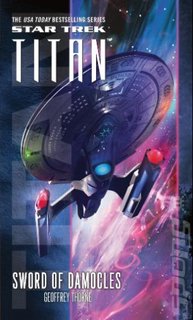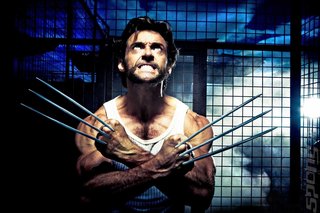Earlier in the week I played, reviewed and gave a mediocre score to The Amazing Spider-Man. The whole thing left me with a powerful desire to be playing a game that actually got to grips with what I like about the character.
This, in turn, led me to issues of authority, authenticity and the storytelling issues facing tie-in media. Which, in turn, led to me unpack the issues and leave them all over your screen...
Putting film and TV aside for a moment, tie-in media has long faced an uphill battle. Games, Books, comics, audio dramas: if the content is not in a property's native medium it has to fight for its audience's investment. Producing a great Star Trek novel is all well and good, but what fans want to know is, "Does it count? Is it part of the canon?" And if it isn't, "Why should I spend my time reading something that isn't part of continuity?"
Oh boy! The "C-Word" - "Continuity." When you hear the C-word, it's tempting to brush aside the concerns of whoever said it as nerdy pedantry. In all fairness, when you get to a certain point of granularity, those concerns can become nerdy pedantry. But, on a broader level, it's a legitimate storytelling concern and, whether they should do or not, games tell stories.
After all, beyond a certain point in a character's or property's life, creators are trading on the fact that you're already invested – or at least interested - in that character or property. In a given issue of Wolverine the writer doesn't have to make you care about Wolverine because, since you've bothered to pick up that issue in the first place, it's kind of a given that you give a shit.
There's a good chance you've read a number of comics with him in before. Maybe you've read comics with him in for years and watched him grow as a character. That's part of the appeal. And, of course, you want to know what happens next.
So, what if you've got a different Wolverine? Say, Hugh Jackman's Wolverine. Now, films and TV don't have the same battle on their hands as, say, comics and games. That's partly because there remains an (at least partly misplaced) perception of comics and games as a ghetto and Hollywood/TV as the entertainment sector to aspire to. A film or show, if done at least reasonably well, has built-in credibility. And in the best examples in these mediums, the creators understand that they are not working with the exact same characters as you find in the source material.
Bryan Singer, David Hayter and Tom DeSanto understood that their Wolverine was not the same as the comics fan's Wolverine. He had a different history, he was taller and less hairy, he would never, ever wear yellow and blue spandex.
They couldn't rest on the character's comics history, because no-one would be looking at the screen and seeing the exact same character they'd read about in the comics, or seen in the cartoon. He had a lot in common with those other two Wolverines, but he wasn't the exact same one. He didn't have their history. What happened to him on screen wouldn't directly impact what happened to him in the comics, and vice-versa.
Singer et al also understood that on-screen Wolverine had to be treated as a different Wolverine because, of course, most of the audience would have very little idea of who the hell he was. So, they took the time to make you care about him all over again.
It's a little more straightforward in the case of mythical figures from history, as there usually isn't one particular source that can claim to be the authoritative, canonical version of a character in the way that you might argue there is for Spider-Man or Buffy. No-one is going to try to tell you that Kevin Costner's Robin Hood and Russell Crowe's Robin Hood are the same Robin Hood. They're different interpretations of the folk hero.
This, in turn, led me to issues of authority, authenticity and the storytelling issues facing tie-in media. Which, in turn, led to me unpack the issues and leave them all over your screen...
Putting film and TV aside for a moment, tie-in media has long faced an uphill battle. Games, Books, comics, audio dramas: if the content is not in a property's native medium it has to fight for its audience's investment. Producing a great Star Trek novel is all well and good, but what fans want to know is, "Does it count? Is it part of the canon?" And if it isn't, "Why should I spend my time reading something that isn't part of continuity?"
Oh boy! The "C-Word" - "Continuity." When you hear the C-word, it's tempting to brush aside the concerns of whoever said it as nerdy pedantry. In all fairness, when you get to a certain point of granularity, those concerns can become nerdy pedantry. But, on a broader level, it's a legitimate storytelling concern and, whether they should do or not, games tell stories.
After all, beyond a certain point in a character's or property's life, creators are trading on the fact that you're already invested – or at least interested - in that character or property. In a given issue of Wolverine the writer doesn't have to make you care about Wolverine because, since you've bothered to pick up that issue in the first place, it's kind of a given that you give a shit.
There's a good chance you've read a number of comics with him in before. Maybe you've read comics with him in for years and watched him grow as a character. That's part of the appeal. And, of course, you want to know what happens next.
So, what if you've got a different Wolverine? Say, Hugh Jackman's Wolverine. Now, films and TV don't have the same battle on their hands as, say, comics and games. That's partly because there remains an (at least partly misplaced) perception of comics and games as a ghetto and Hollywood/TV as the entertainment sector to aspire to. A film or show, if done at least reasonably well, has built-in credibility. And in the best examples in these mediums, the creators understand that they are not working with the exact same characters as you find in the source material.
Bryan Singer, David Hayter and Tom DeSanto understood that their Wolverine was not the same as the comics fan's Wolverine. He had a different history, he was taller and less hairy, he would never, ever wear yellow and blue spandex.
They couldn't rest on the character's comics history, because no-one would be looking at the screen and seeing the exact same character they'd read about in the comics, or seen in the cartoon. He had a lot in common with those other two Wolverines, but he wasn't the exact same one. He didn't have their history. What happened to him on screen wouldn't directly impact what happened to him in the comics, and vice-versa.
Singer et al also understood that on-screen Wolverine had to be treated as a different Wolverine because, of course, most of the audience would have very little idea of who the hell he was. So, they took the time to make you care about him all over again.
It's a little more straightforward in the case of mythical figures from history, as there usually isn't one particular source that can claim to be the authoritative, canonical version of a character in the way that you might argue there is for Spider-Man or Buffy. No-one is going to try to tell you that Kevin Costner's Robin Hood and Russell Crowe's Robin Hood are the same Robin Hood. They're different interpretations of the folk hero.
Read More Like This
Comments
This I all, I think "nerdy pedantry". The reason being that all of these media (or mediums if you prefer) reinvent, re-start, reboot and remix themselves with careless abandon.
The Spider-man films to which you are referring completely and totally ignore the fact that JUST FIVE YEARS AGO Tobey Maguire was poncing about in the Red and Blue spandex.
Before The Dark Knight movie pissed on the memory of Val Kilmer pissing on the memory of Michael Keaton pissing on the memory of Adam West pissing on the memory of Lewis Wilson, the comic of the same name pissed on the memory of Seventies Batman comics pissing on the memory of Silver Age Batman comics pissing on the memory of Golden Age Batman comics.
You are talking about media that are by their own choice ephemeral. Media the multifarious and multitudinous creators of which, in their shortage of ideas and their excess of ideas, rehash and ignore preceding ones in their enthusiasm to promulgate new ones. Media which licence, re-licence, syndicate, and replicate their IP wherever they can. Your citing of Whedon is telling, because he is one of the few auteurs in the industry who has the creative chops and the commercial power to care about his characters and to exercise that care. Most of the rest is aspirational hired hands churning out sausage meat for the Disney or Warner Brothers machines, and when they are told to change the flavour - they do it. Because they have to.
The idea that there is canon is actually balls.
The Spider-man films to which you are referring completely and totally ignore the fact that JUST FIVE YEARS AGO Tobey Maguire was poncing about in the Red and Blue spandex.
Before The Dark Knight movie pissed on the memory of Val Kilmer pissing on the memory of Michael Keaton pissing on the memory of Adam West pissing on the memory of Lewis Wilson, the comic of the same name pissed on the memory of Seventies Batman comics pissing on the memory of Silver Age Batman comics pissing on the memory of Golden Age Batman comics.
You are talking about media that are by their own choice ephemeral. Media the multifarious and multitudinous creators of which, in their shortage of ideas and their excess of ideas, rehash and ignore preceding ones in their enthusiasm to promulgate new ones. Media which licence, re-licence, syndicate, and replicate their IP wherever they can. Your citing of Whedon is telling, because he is one of the few auteurs in the industry who has the creative chops and the commercial power to care about his characters and to exercise that care. Most of the rest is aspirational hired hands churning out sausage meat for the Disney or Warner Brothers machines, and when they are told to change the flavour - they do it. Because they have to.
The idea that there is canon is actually balls.
@DoctorDee My point being that it's precisely when things like games stop trying to pander to an established continuity that they work the best. Films are good at this because Hollywood is confident (or arrogant) enough to reinvent/re-interpret properties that were birthed in other mediums. Games, books and comics are much more likely to try to play in the established sandbox, and as a result end up feeling very peripheral with very disposable stories.



